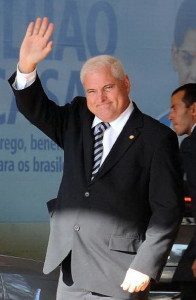Searching for Panama’s Martinelli
Ricardo Martinelli, Panama’s ex-president, is being sought for investigation by the Panamanian Supreme Court for alleged crimes of corruption during his administration. Ever since he left the country in late January to attend the session in Guatemala as a member of the Central American Parliament, Martinelli has not returned to Panama, thus raising accusations of fleeing his prosecution at home. The ex-president is being accused of several corrupt contracts established during his administration, as well as of tapping his political opponents’ phone conversations during the 2009 elections. Many of the in Panamanians and world leaders that once lauded his pro-business, democratic platform in 2009 are denouncing now his authoritarian political measures.

It has become a tendency in the past few years for Latin American voters to turn away from the leftist political currents once headed by Hugo Chavez in Venezuela. Despite the significant amount of countries in Latin America whose current administrations are more of a center-left ideology, the overall consensus in the region is of a preference for those leaders who respect private property, who will bring about economic growth and reduction of poverty, but perhaps most importantly, for leaders that doesn’t step over the legitimacy of democratic institutions, as so many already have in the history of Latin America.
Popular impressions on Martinelli have therefore changed radically since the 2009 elections. A business man himself, president of the supermarket chain Super 99 and two other companies, he instilled confidence in Panamanians of his support for the private enterprise and foreign investment. During his administration, Martinelli had a fair share of victories to celebrate, ordering spending geared towards the reduction of poverty and an ambitious agenda for infrastructure spending. He reformed the tax system in order to improve collection and reduce tax rates. He also formally established a bilateral free trade agreement between Panama and the US. For Panama especially, a country built on foreign investment and whose annual growth rates surpass the 8% (exorbitant compared to the sluggish 2% of Latin America as a whole), Martinelli’s expansive economic policy was well received, except perhaps by those who warned of the sustainability of his fiscal policy and the public debt he would leave to the next administration.
Nonetheless, his economic policy was highly contended in Panama. Once word of political scandals and corruption stated spreading, Martinelli’s reputation began to decay. Billion-dollar contracts secured by Martinelli are now under scrutiny for having been established under unethical processes. Allegations of corruption have risen around a program he set forth for the distribution of dried food during his administration. Moreover, last week, 44 testified as witnesses or victims of the wire-tapping scandal of 2009. His former vice-president, Juan Carlos Varela, now current president of Panama and leader of the opposing party, promised as he took office that he’d rid the government of corruption and instill more transparent processes. In light of the accusations towards Martinelli, it seems Varela’s promise is taking effect, while Martinelli’s reputation, both in Panama and internationally, is going in a downward spiral.
Panama’s Supreme Court is carrying out the investigations against Martinelli, and the prosecutors are warning of a search by the Interpol. Meanwhile, Panamanians and Latin Americans are lamenting being on international headlines, once again, due to a presidential corruption scandal. Panama’s incredible economic growth, which has earned it the title of the Latin American Singapore, seems to come at a high cost: corruption, even at the highest levels of government.
